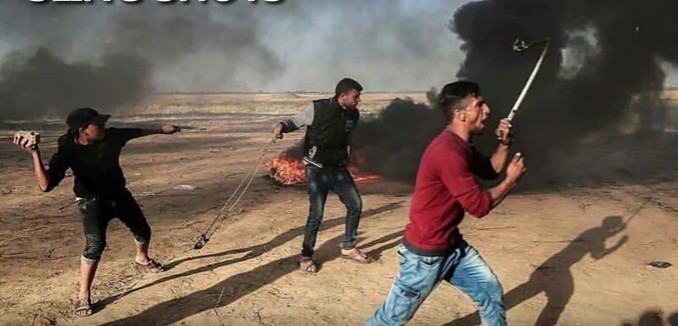Iran has been seeking to escalate tensions along Israel’s southern border with Gaza, with the goal of “deterring” Israel from taking decisive action either in its north or south, an expert on Lebanon argued in an essay published Monday in Tablet.
Tony Badran, a research fellow at the Foundation for Defense of Democracies, noted that various factions in Gaza have, in recent weeks, fired rockets into Israel and that these attacks should not be viewed as accidental, but rather “as part of a coordinated Iranian strategy.”
Iran, for its part, has been seeking to establish a military presence in Syria, something Israel cannot tolerate. So “over the past year especially, the Israeli Air Force has been bombing Iran’s military infrastructure in Syria at will.” Iran does not have the military capabilities to deter Israel directly.
Even as Iran and its allies continue to capture southern Syria for the Assad regime, they have been careful to operate only on the border with Jordan, not on the border with Israel because that would carry “the risk of Israeli action, especially since the Iranian-led militias are embedded with whatever remains of Assad’s military, and there is documentation of their participation in the offensive.”
Iran isn’t anxious to attack Israel through Lebanon, as that would lead to the devastation of Hezbollah’s home base.
And while Russian President Vladimir Putin doesn’t seem serious about his insistence that no non-Syrian forces should remain in Syria, he is doing nothing to prevent Israel from attacking Iranian assets in Syria.
This leaves Iran with one option to protect its assets in Syria.
“The purpose of all the activity in Gaza, therefore, is to tie down and distract Israel, and then look to divide its forces between two active fronts, in the hope of deterring them from truly acting on either,” Badran observed. “If successful, Iran will have set up fronts on Israel’s borders with Gaza, Lebanon and Syria.”
Israel, on the other hand, will not allow the establishment of an Iranian military presence on its border. Nor will Israel tolerate “low-intensity conflict on their borders as a norm.”
“We have just one option,” Brig.-Gen. (ret.) Shimon Shapira, an Israeli scholar of Hezbollah and Iran, told Badran. “And that is to act with force, overtly and covertly, against the Iranian presence in Syria. Consenting to or accepting the Iranian presence, be it direct or indirect, in the end will lead to a war with Iran in Syria and in Lebanon.”
Where are the building threats from Iran leading?
Badran concluded by noting that Israeli Prime Minister Benjamin Netanyahu recently said that “if there needs to be” conflict with Iran, “it is better now than later.”
[Photo: Israel Foreign Affairs Min. / YouTube ]




